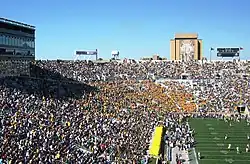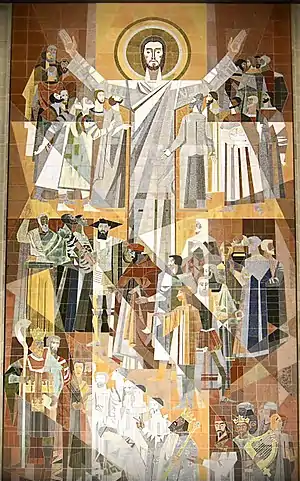Notre Dame Stadium
Notre Dame Stadium is the home football stadium for the University of Notre Dame. The university's football team are the Fighting Irish. The stadium is located on the university's campus in Notre Dame, Indiana, just north of the city of South Bend. It was opened in 1930. The stadium can seat over 80,000 people.
The House That Rockne Built | |
 | |
| Location | Notre Dame, Indiana |
|---|---|
| Coordinates | 41°41′54″N 86°14′2″W |
| Owner | University of Notre Dame |
| Operator | University of Notre Dame |
| Capacity | 80,795 59,075 (1996) |
| Surface | FieldTurf |
| Construction | |
| Started | 1930 |
| Opened | 1930 |
| Construction cost | $750,000 |
| Tenants | |
| Notre Dame Fighting Irish (NCAA) (1930-present) | |
History
The stadium opened in 1930. It replaced the old stadium Cartier Field. It cost more than US$750,000 to build. The head coach of the Fighting Irish, Knute Rockne, played an important role in the design of the stadium. The design was based on Michigan Stadium. The stadium originally held 54,000 people. It measured a half-mile (0.8 kilometres) in circumference and stood 45 feet (14 m) high. It was built by the Sollitt Construction Company of South Bend. They began building in April 1930, and took six months to build.[1][2] The Irish played their first game in the new stadium on 4 October 1930. They beat the SMU Mustangs 20–14. The official dedication was on October 11 against Navy.
Over the years, the stadium's seating capacity was gradually increased to 59,075. This was mainly done by making most of the seats smaller. In 1997, 21,000 new seats were added to the stadium, bringing the seating capacity to the present 80,795. Permanent lights were also installed. The lights were paid for by NBC, which has held the exclusive television rights to all home games since 1991.
The playing surface was natural grass throughout the stadium's history until FieldTurf, an advanced artificial surface, was installed before the 2014 football season.
Touchdown Jesus

The stadium is known for its view of Touchdown Jesus (actually titled The Word of Life), a large mural of the resurrected Jesus.[3] The mural is painted on the southern exterior wall of the Hesburgh Library. It is 132 ft (40 m) high and 65 ft (20 m) wide. It can be seen over the northern end zone of the stadium.[4] The mural was designed by Millard Sheets and was constructed in 1964. It cost US$200,000. It is contains 81 types of stone from 16 countries, and is composed of hundreds of panels which incorporate 6,700 pieces of granite.[5]
In 1997, fans protested the university's plans to add 20,000 seats to the stadium. These seats would have blocked the view of Touchdown Jesus from the field. The university then considered limiting seats in the end zone. For aesthetic reasons however, developers went with a larger bowl all the way around. As a result, the view of Touchdown Jesus was partially blocked.[5]
References
- Notre Dame archives
- Being Catholic, Being American The Notre Dame Story, 1842-1934, Robert E Burns, University of Notre Dame Press, Notre Dame Indiana, 1999
- University of Notre Dame, Hesburgh Libraries, Hesburgh (Main) Library Word of Life Mural Archived 2006-08-07 at the Wayback Machine
- Hesburgh Library
- "Touchdown Jesus". Archived from the original on 2013-04-20. Retrieved 2013-10-09.
Other websites
- Notre Dame Stadium Archived 2009-02-26 at the Wayback Machine